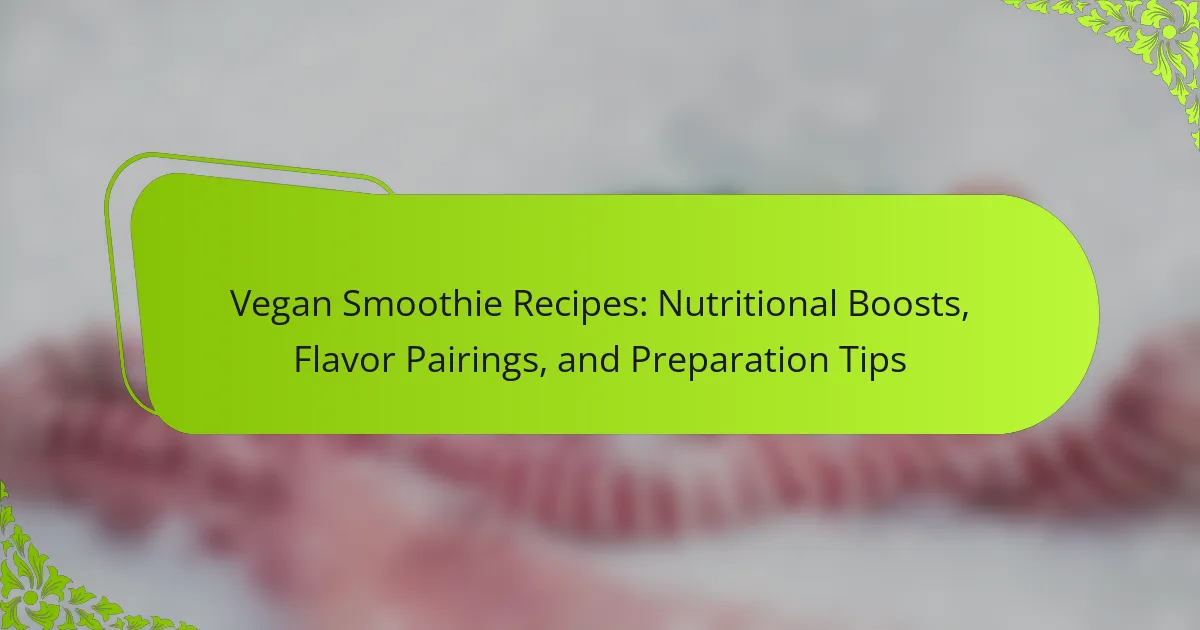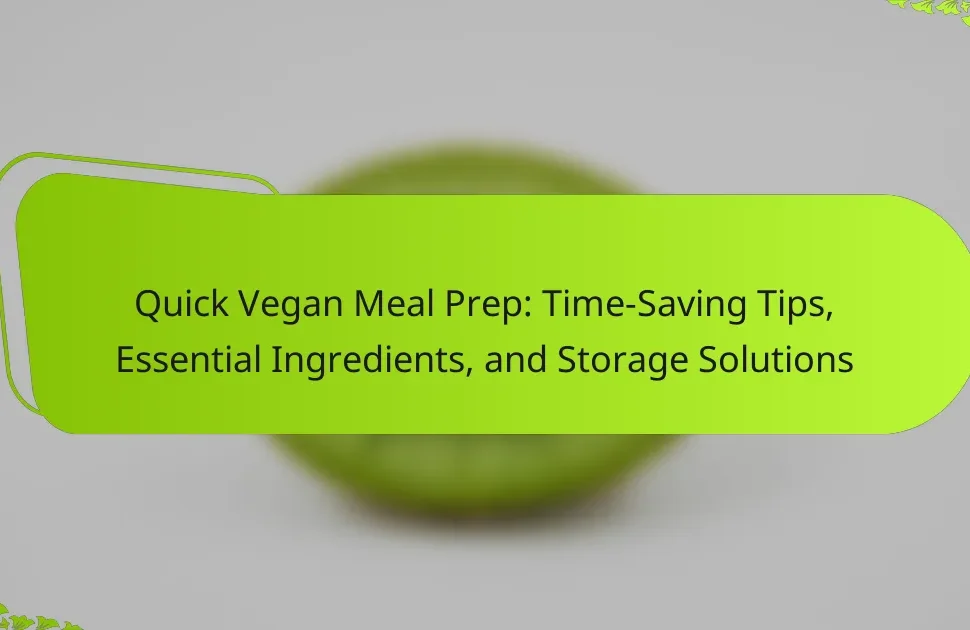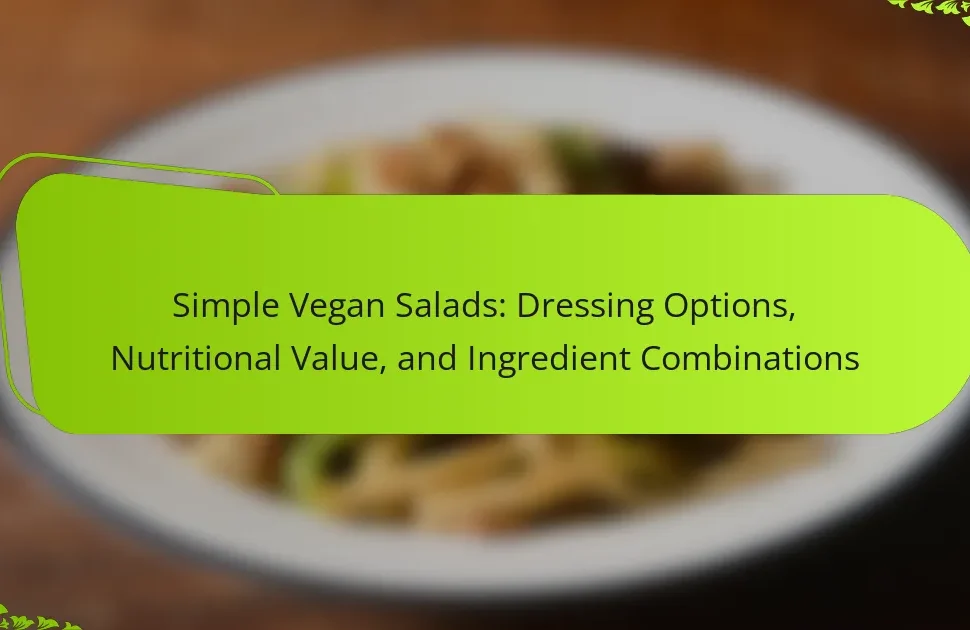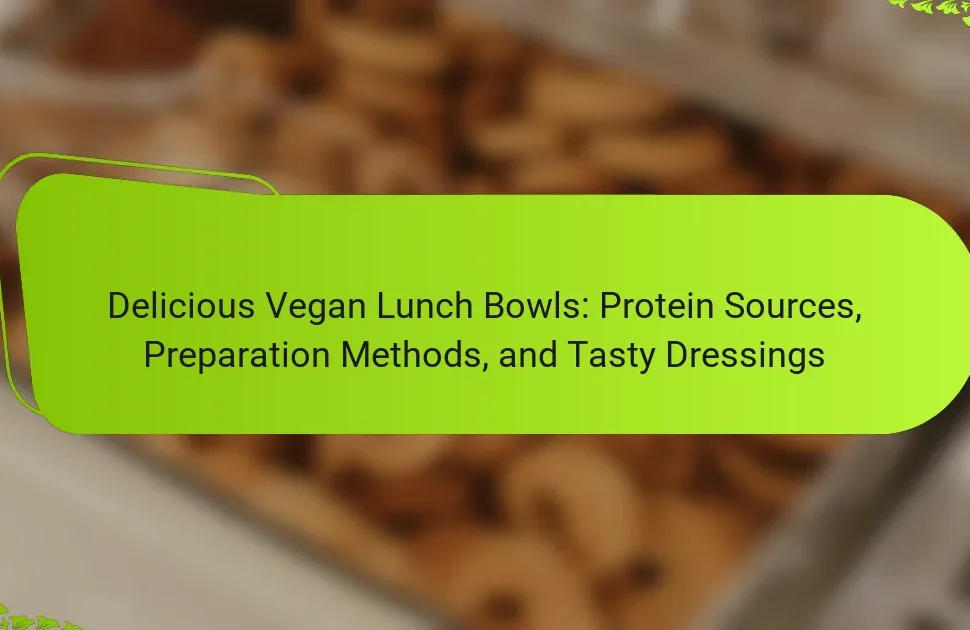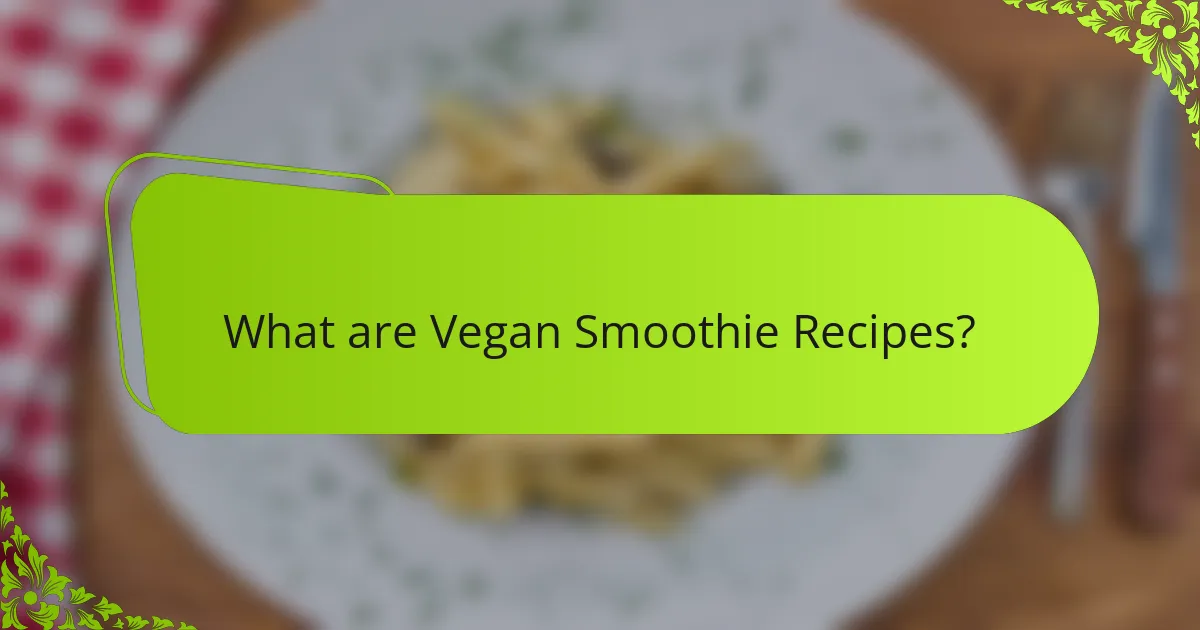
What are Vegan Smoothie Recipes?
Vegan smoothie recipes are blended drinks made entirely from plant-based ingredients. These recipes typically include fruits, vegetables, plant-based milk, and sometimes seeds or nuts. They provide a nutritious option for those following a vegan diet. Vegan smoothies can be customized to suit individual taste preferences and nutritional needs. Common ingredients include bananas, spinach, almond milk, and chia seeds. These smoothies are often rich in vitamins, minerals, and fiber. They serve as a quick meal replacement or a healthy snack. Many people enjoy vegan smoothies for their health benefits and delicious flavors.
How do Vegan Smoothie Recipes differ from traditional smoothies?
Vegan smoothie recipes differ from traditional smoothies primarily by excluding all animal products. Traditional smoothies often include dairy ingredients like yogurt or milk. Vegan smoothies utilize plant-based alternatives such as almond milk or coconut yogurt. This shift impacts the nutritional profile, often reducing saturated fats and cholesterol. Additionally, vegan smoothies may incorporate a wider variety of fruits and vegetables. Ingredients like spinach, kale, and chia seeds are commonly used for added nutrients. The flavor profiles can also vary, as vegan recipes may emphasize natural sweetness from fruits. Overall, vegan smoothies cater to dietary preferences while maintaining health benefits.
What ingredients are typically used in Vegan Smoothie Recipes?
Vegan smoothie recipes typically use fruits, vegetables, plant-based milk, and sweeteners. Common fruits include bananas, berries, and mangoes. Leafy greens like spinach and kale are popular vegetable choices. Almond milk, coconut milk, and oat milk serve as plant-based liquid bases. Natural sweeteners such as maple syrup or agave nectar enhance flavor. Additionally, ingredients like nut butters and seeds provide healthy fats and protein. These components create nutritious and flavorful smoothies suitable for a vegan diet.
What are the nutritional benefits of choosing vegan ingredients?
Choosing vegan ingredients offers numerous nutritional benefits. Vegan ingredients are typically lower in calories and saturated fats. They are rich in dietary fiber, which aids digestion and promotes satiety. Additionally, they provide essential vitamins and minerals, such as vitamin C, potassium, and magnesium.
Research shows that plant-based diets can reduce the risk of chronic diseases. A study published in the Journal of the American College of Cardiology found that plant-based diets lower heart disease risk. Vegan ingredients also contain antioxidants that combat inflammation and oxidative stress.
Furthermore, they support healthy weight management. A systematic review by the Academy of Nutrition and Dietetics indicated that vegans tend to have lower body mass indexes (BMIs). Overall, incorporating vegan ingredients enhances nutritional profiles significantly.
Why should you incorporate Vegan Smoothie Recipes into your diet?
Incorporating vegan smoothie recipes into your diet can enhance your nutritional intake. These smoothies are packed with vitamins, minerals, and antioxidants from fruits and vegetables. They can help improve digestion due to the fiber content. Vegan smoothies are often lower in calories compared to traditional smoothies with dairy. Many recipes include superfoods like spinach or chia seeds, which provide additional health benefits. Studies show that a diet rich in plant-based foods can reduce the risk of chronic diseases. For example, a study published in the Journal of Nutrition found that plant-based diets are associated with lower blood pressure and cholesterol levels. Therefore, vegan smoothies can be a delicious and healthy addition to your daily meals.
What health benefits are associated with a vegan diet?
A vegan diet offers numerous health benefits. It is associated with lower risks of heart disease. Studies show that vegans have lower cholesterol levels. A vegan diet can reduce the risk of type 2 diabetes. Research indicates that plant-based diets improve blood sugar control. Vegans typically have lower body mass indexes (BMIs). This diet is rich in fruits, vegetables, and whole grains. These foods provide essential nutrients and antioxidants. A vegan diet may enhance digestive health due to high fiber content.
How can Vegan Smoothie Recipes support weight management?
Vegan smoothie recipes can support weight management by providing nutrient-dense, low-calorie options. These smoothies often include fruits and vegetables, which are high in fiber. Fiber promotes satiety, helping individuals feel full longer. Many vegan smoothies incorporate plant-based proteins, which can also aid in appetite control. The use of whole food ingredients ensures minimal added sugars and unhealthy fats. Research indicates that high-fiber diets can lead to weight loss and improved body composition. A study published in the Journal of Nutrition found that individuals consuming high-fiber foods had a lower risk of obesity. Therefore, incorporating vegan smoothies into a diet can be an effective strategy for weight management.
What are some popular flavor pairings for Vegan Smoothie Recipes?
Popular flavor pairings for vegan smoothie recipes include banana with spinach and almond milk. This combination offers a creamy texture and nutritional benefits. Another pairing is mixed berries with coconut water. This mix provides hydration and antioxidants. Mango and kale create a tropical flavor while boosting vitamins. Pineapple with ginger adds a zesty kick and digestive benefits. Avocado paired with cacao powder delivers healthy fats and a rich taste. These combinations enhance both flavor and nutrition in vegan smoothies.
Which fruits are best for creating balanced flavors?
Citrus fruits, berries, and bananas are best for creating balanced flavors. Citrus fruits like oranges and lemons add acidity, enhancing sweetness. Berries provide a mix of tartness and sweetness, complementing other ingredients. Bananas offer creaminess and natural sweetness, smoothing out flavors. Combining these fruits achieves a harmonious taste profile in smoothies. Their diverse flavor profiles allow for versatility in recipes.
How can you enhance the taste of your smoothies with spices and herbs?
You can enhance the taste of your smoothies with spices and herbs by incorporating ingredients like cinnamon, ginger, and mint. Cinnamon adds warmth and sweetness without extra calories. Ginger contributes a zesty kick and has anti-inflammatory properties. Mint provides a refreshing flavor that can brighten smoothies. Turmeric offers an earthy taste and health benefits due to its antioxidant properties. Adding a pinch of cayenne pepper can introduce a subtle heat, enhancing flavor complexity. Experimenting with these spices and herbs can create unique flavor profiles tailored to personal preferences.
What are effective preparation tips for making Vegan Smoothies?
Effective preparation tips for making vegan smoothies include using frozen fruits for a thicker texture. Frozen fruits retain nutrients and enhance flavor. Always blend liquids first to ensure a smooth consistency. This helps in breaking down solid ingredients effectively. Incorporate leafy greens like spinach or kale for added nutrition. These greens blend well without overpowering the flavor. Use plant-based milk or water as a base for creaminess. This choice keeps the smoothie vegan-friendly. Experiment with different fruits for varied taste profiles. For example, bananas add creaminess, while berries provide tartness. Lastly, add seeds or nut butter for healthy fats and protein. This boosts the smoothie’s nutritional value significantly.
How can you achieve the perfect smoothie consistency?
To achieve the perfect smoothie consistency, balance the ingredients carefully. Start with a liquid base like almond milk or coconut water. Use frozen fruits to add thickness without excess liquid. Incorporate a ripe banana for creaminess. Adjust the amount of greens to maintain a smooth texture. Blend on high speed until fully combined. Stop and scrape down the sides as needed for even blending. The ideal consistency is thick yet pourable, allowing for easy drinking.
What tools and equipment are essential for smoothie preparation?
Essential tools and equipment for smoothie preparation include a high-speed blender, measuring cups, and cutting boards. A high-speed blender efficiently blends ingredients to a smooth consistency. Measuring cups ensure accurate ingredient portions for balanced flavors. Cutting boards provide a safe surface for chopping fruits and vegetables. Additionally, a spatula helps in scraping down the sides of the blender for thorough mixing. Ice trays are useful for freezing fruits or making ice cubes to chill smoothies. Lastly, reusable straws or cups enhance the smoothie experience while promoting sustainability.
How can you customize Vegan Smoothie Recipes for specific nutritional boosts?
To customize vegan smoothie recipes for specific nutritional boosts, incorporate targeted ingredients. For protein enhancement, add protein powder, nut butter, or silken tofu. For fiber, include chia seeds, flaxseeds, or oats. To increase antioxidants, use berries, spinach, or kale. For healthy fats, integrate avocado or coconut oil. Incorporating superfoods like spirulina or maca powder can also enhance nutritional value. Each ingredient contributes specific nutrients, helping achieve desired health benefits. For example, chia seeds provide omega-3 fatty acids, while spinach offers iron.
What superfoods can be added to enhance nutritional value?
Chia seeds are a superfood that can enhance nutritional value. They are high in omega-3 fatty acids, fiber, and protein. Adding just two tablespoons provides 140 calories, 11 grams of fiber, and 4 grams of protein. Spirulina is another superfood option. It is rich in protein, vitamins, and minerals. One tablespoon contains around 20 calories and 4 grams of protein. Acai berries are also beneficial. They are packed with antioxidants and healthy fats. One serving provides significant amounts of vitamins A and C. Incorporating these superfoods into vegan smoothies can significantly boost their nutritional profile.
How do different protein sources affect the smoothie’s benefits?
Different protein sources significantly influence the nutritional benefits of smoothies. Plant-based proteins, such as pea, hemp, and soy, provide essential amino acids and are easier to digest. For example, pea protein is rich in iron and supports muscle recovery. Hemp protein contains omega-3 fatty acids, which promote heart health.
Soy protein offers a complete amino acid profile, beneficial for muscle growth. In contrast, protein sources like whey, while effective for muscle building, are not suitable for vegan smoothies. The choice of protein impacts the smoothie’s overall nutrient density and health benefits.
Research shows that incorporating protein into smoothies can enhance satiety and aid weight management. A study published in the “American Journal of Clinical Nutrition” indicates that higher protein intake increases feelings of fullness. Thus, selecting the right protein source can optimize the health benefits of smoothies.
What common mistakes should you avoid when making Vegan Smoothies?
Common mistakes to avoid when making vegan smoothies include using too many high-calorie ingredients. This can lead to excessive calorie intake. Another mistake is not balancing flavors. A smoothie can become too sweet or too bitter without proper balance. Failing to include enough liquid is also common. Smoothies need sufficient liquid for a smooth texture. Overloading on greens without adding fruits can make smoothies taste unpleasant. Not using frozen fruits can result in a less refreshing texture. Additionally, neglecting protein sources can lead to a less satisfying meal. Lastly, skipping the taste test before serving can result in an unpalatable final product.
How can ingredient choices impact the overall health benefits?
Ingredient choices significantly impact the overall health benefits of vegan smoothies. The selection of fruits, vegetables, and additional ingredients determines the nutritional profile. For instance, leafy greens like spinach provide vitamins A, C, and K, while berries are rich in antioxidants. Using nut butters can add healthy fats and protein, enhancing satiety. The glycemic index of ingredients affects blood sugar levels; lower glycemic options promote stable energy. Moreover, the inclusion of superfoods like chia seeds boosts omega-3 fatty acids and fiber content. Research indicates that diverse ingredient combinations can optimize nutrient absorption and overall health. Studies show that smoothies with a variety of ingredients can improve nutrient intake by up to 30%. Therefore, thoughtful ingredient choices are crucial for maximizing health benefits in vegan smoothies.
What are some tips for balancing flavors without added sugars?
To balance flavors without added sugars, use natural ingredients that enhance taste. Incorporate fruits like berries, which are low in sugar and high in flavor. Utilize spices, such as cinnamon or ginger, to add warmth and complexity. Citrus juices, like lemon or lime, can provide brightness and acidity. Add herbs, such as mint or basil, for freshness and aromatic notes. Experiment with different plant-based milks for creaminess without sweetness. Incorporate unsweetened nut butters for richness and flavor depth. These methods create a well-rounded taste profile while maintaining a healthy approach.
What are the best practices for storage and serving of Vegan Smoothies?
Vegan smoothies should be stored in airtight containers to maintain freshness. Glass jars or BPA-free plastic containers are ideal for storage. Store smoothies in the refrigerator if consumed within 24 hours. For longer storage, freezing is recommended. Use freezer-safe containers and leave some space for expansion. When serving, shake or stir the smoothie to recombine ingredients. Serve chilled for the best flavor and texture. Always use clean utensils to avoid contamination. These practices help preserve nutrients and enhance taste.
Vegan smoothie recipes are nutritious blended drinks made entirely from plant-based ingredients, including fruits, vegetables, and plant-based milk. This article covers the differences between vegan and traditional smoothies, typical ingredients, and their associated health benefits, such as improved digestion and reduced risk of chronic diseases. Additionally, it explores popular flavor pairings, tips for achieving the perfect consistency, and common mistakes to avoid when preparing vegan smoothies. The article emphasizes the importance of ingredient choices in enhancing nutritional value and offers guidance on how to customize smoothies for specific dietary needs.
